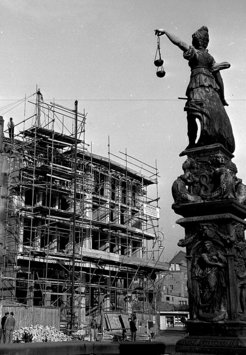The judge-made law dispute of the early Federal Republic of Germany
Research Project

The so-called ‘Judge-Made Law Dispute’ intensified in Germany in the 1950s and has since become a fixed part of the methodological discussion in German legal scholarship. In terms of content, it primarily addresses three questions. First, when is a court decision considered judge-made law? Second, is the decision referred to as judge-made law thereby legal and normative? Third, how is this judge-made law methodologically dealt with and utilised for legal application? These questions remain current and unresolved to this day. Moreover, it is unclear why the discussion on this topic has intensified both quantitatively and qualitatively since the 1950s.
The project aims to clarify three guiding questions. What are the historical roots of this dispute? How did the dispute evolve within the period to be investigated? Why is there even a debate within the legal profession about whether judges can establish law? In the period examined, spanning the post-war era to the end of the 1960s, the genesis of the dispute will be presented and clarified within the framework of the abovementioned guiding questions. To answer the questions, the manifestations and nuances of the term ‘Richterrecht’ will first need to be clarified. Subsequently, the theories of individual authors will be presented, and finally an attempt will be made to explain why and how they originated. In doing so, a segment of the long-standing dispute concerning judge-made law will be examined from an epistemological perspective.
